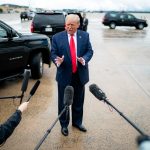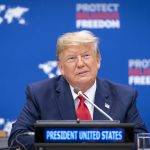President Trump remains steadfast in his commitment to the ambitious “Liberation Day” tariff package, claiming those tariffs are hitting the mark as intended. While airborne on Air Force One after a sunny retreat in Florida, Trump shared his views on the diplomatic landscape, highlighting the eagerness of global leaders to strike favorable agreements. He underscored that the U.S. won’t subsidize trade deficits, firmly believing that a deficit is akin to a sports team losing the game.
The weekend saw Trump issuing a rallying cry for American strength on social media, asserting that China is suffering much worse from these tariffs than the U.S. His exuberance about the quickly approaching economic renaissance is almost palpable, with reports of over five trillion dollars pouring back into the American economy. This isn’t just any recovery — it’s an economic revolution, as Trump himself has put it. The anticipation for job creation and business resurgence is likewise building, reflecting a renewed vigor in America’s financial landscape.
Of course, there’s a fair share of skepticism floating around, particularly among certain GOP leaders. Senator John Barrasso articulated that while Trump has the right to pursue tariff strategies, there is unease percolating throughout the nation as observers track stock market fluctuations. It seems that some Republicans are quaking in their boots at the idea of taking on China and Europe with tariffs. Concerns over temporary stock dips might be leading them to contemplate a bill that would put a speed bump on Trump’s newfound powers.
Trump Issues Public Response to European Countries 'Dying to Make a Deal' on Tariff's – He's Got Them Right Where He Wants Them https://t.co/TTAFhMdRXT
— Observing Time (@TimeObserving) April 7, 2025
Meanwhile, the constantly arid desert of logic embodies the liberal critics, including ex-Treasury Secretary Lawrence Summers, who doubles down on the idea that engaging in negotiations detracts from the potential successes of tariffs. The problem here is simple: without an ascendant position from which to negotiate, tariffs serve as the essential starting point for discussions with other nations. It’s as if those who oppose this approach prefer a high-five instead of a solid punch to the gut when it comes to trade strategy.
Interestingly, the airwaves are buzzing about foreign leaders, including Israel’s Benjamin Netanyahu and Italy’s Giorgia Meloni, eager to engage on tariffs. Is the press tiptoeing around the fact that Trump’s strategy might just be effective? His playbook has long been about starting negotiations from a position of strength, and the chatter from those foreign leaders suggests they may finally be recognizing the logic behind this approach.
Global competitors have enjoyed unchallenged trade practices for far too long while America played the role of a complacent bystander, letting the elites and the politically correct dictate trade terms. This is the time for an America-first policy to take center stage. With the midterms on the horizon, Trump’s aggressive policy positions are sharpening the narrative, placing him and the Republican party in a powerful position to claim the mantle of decisive leadership that the country desperately needs. The prospect of returning jobs and industries promises a robust comeback, and for conservatives, that’s all that matters.




